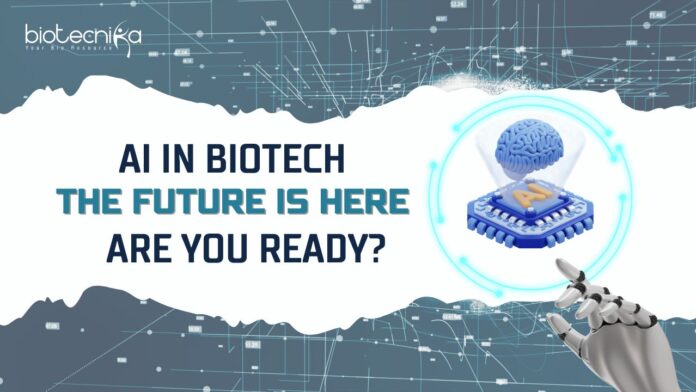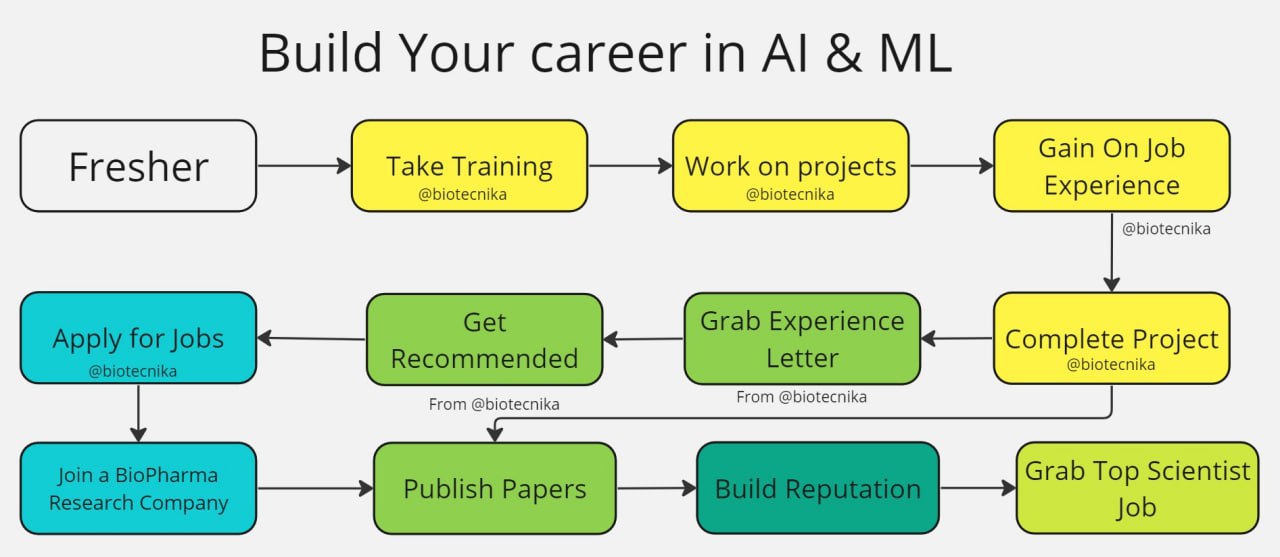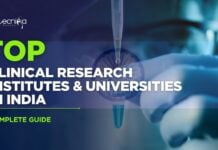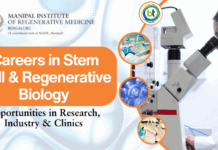AI in Biotech: The Future Is Here!
“Success in creating AI would be the biggest event in human history. Unfortunately, it might also be the last unless we learn to avoid the risks.” – Stephen Hawking.
A century ago, biotechnology gave us vaccines and antibiotics. Decades later, genetic engineering and genomics redefined medicine. Now, we stand at the cusp of a new era where Artificial Intelligence promises to accelerate biotech advancements like never before.
Biotechnology is known for transforming healthcare, agriculture, and environmental science. The transformation is becoming unprecedented as it integrates with Artificial Intelligence (AI). The ability of AI to analyze and process significant datasets is helping unlock new opportunities in biological discoveries. And from the applications of drug discovery to sustainable farming, AI is driving practical innovation. This shows that the future is undoubtedly here.
Artificial Intelligence, popularly known as AI, refers to simulating human intelligence in machines. This stimulation has been programmed so the machine can think like a human, learn from new experiences, and make its own decisions.
In biotechnology, AI has broken the path of traditional coding from advanced algorithms and machine learning to describe complex biological processes so that precise and predictive insights can be made.
Table of Contents
Importance of AI in Biotech
The biotech industry uses enormous datasets such as genomes, protein structures, and clinical trials. As these data sets are comparatively huge, traditional methods consume more time, and analyzing data will become much more complicated.
AI provides a solution for this challenge by:
- Handling complex datasets quickly and accurately.
- Predicting outcomes to guide research.
- Identifying patterns for innovative breakthroughs.
Applications of AI in Biotechnology
1. AI in Drug Discovery and Development:
AI is transforming the development of drugs. With the help of machine learning models, molecular structures are analyzed and predicted much faster. This leads to drastically improved discovery and testing of drugs. Thereby reducing the time and cost required for the process.
Key Breakthroughs:
- AlphaFold by DeepMind: Solves protein folding—a decades-old problem—with near-perfect accuracy, accelerating drug design.
- Insilico Medicine: Uses AI to design new drug molecules, with the first AI-developed drug entering human trials.
AI enables the cost-effective development of drugs by reducing trial-and-error procedures. It also helps develop treatment procedures for precision medicine by analyzing the genetic makeup.
2. Genomics and Personalized Medicine
AI is advancing genomics by decoding DNA faster and more accurately. This is crucial for personalized medicine, where treatments are designed based on an individual’s genetic makeup.
Recent Research:
- AI-driven tools like CRISPR-AI enhance the precision of genome editing.
- AI systems identify biomarkers for diseases such as cancer and Alzheimer’s.
Benefits include early detection of genetic predisposition to diseases. And also customizing treatments and therapies that will be unique to each individual based on their profiles.
AI ML in Biology, Bioinformatics & Computational Biology Training Program is Starting from 20th February 2025!
WORK ON PROJECTS + GET WORK EXPERIENCE + PUBLISH PAPERS + GET EXPERIENCE & RECOMMENDATION LETTER
Whatsapp Us for Details: https://bit.ly/aiml-whatsapp
3. AI for Sustainable Agriculture
AI applications in agriculture are addressing global food security and environmental challenges. From monitoring crop health to predicting yields, AI is optimizing farming practices.
Latest Innovations:
- Blue River Technology: Uses AI for precision farming, such as targeted pesticide application.
- IBM Watson Decision Platform: Analyzes weather patterns to guide planting and harvesting schedules.
Essential benefits include increased efficiency and sustainability.
4. AI-Driven Environmental Solution
AI is tackling environmental challenges through enhanced waste management, pollution control, and biofuel production. By analyzing microbial ecosystems, AI predicts the effectiveness of bioremediation processes.
Innovations:
- AI-assisted tools identify microbes that break down pollutants.
- Predictive models for ecosystem recovery and sustainability.
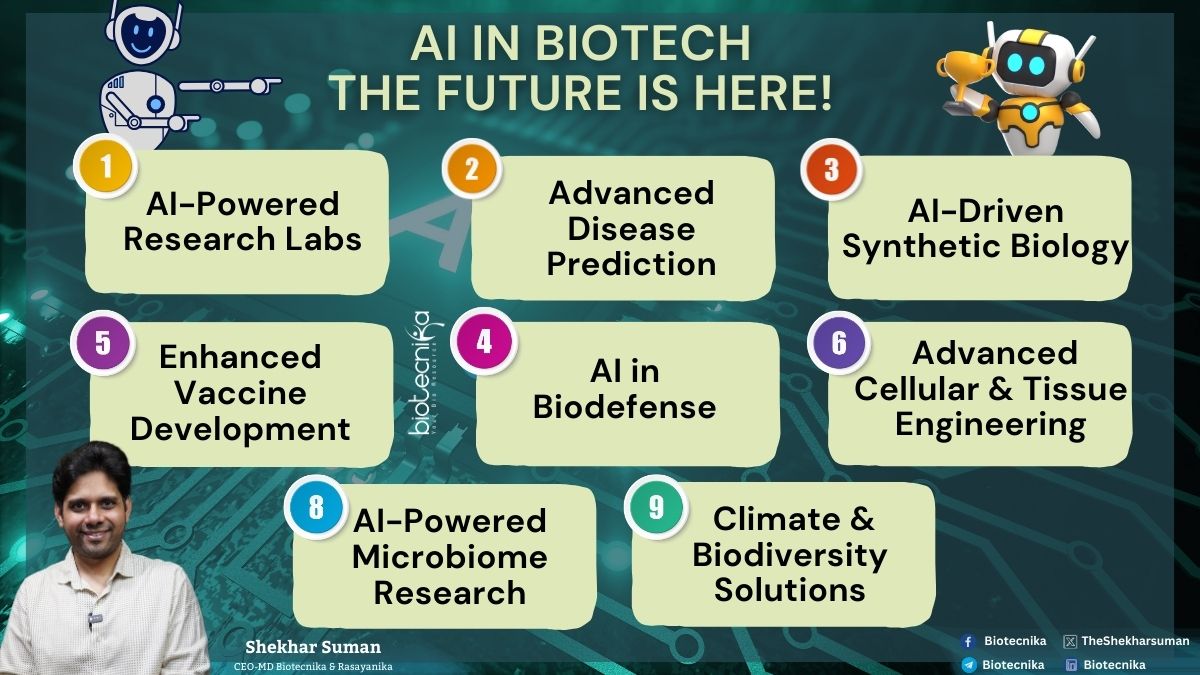
The Future of AI in Biotechnology – AI in Biotech
Integration of AI in Research Labs
The future laboratories are integrating AI technology. This will lead to automated experimental procedures and data analysis. With this type of advancement, human errors can be minimized.
Prediction of Disease
AI will make predictive analytics for global health challenges even stronger. For example:
- Pandemic Preparedness: AI is already being applied in tools such as BlueDot and HealthMap to predict disease outbreaks.
- Cancer Prediction: Artificial system that can correctly signal cancer at its nascent stage.
Collaboration of AI and Synthetic Biology
Synthetic biology, which is the designing and construction of new biological parts, is now being accelerated by AI. The tools include BioXp™ 9600, an automated DNA synthesis and genome assembly tool.
Integration of AI with Wearable and IoT Devices
To get enhanced real-time health monitoring and diagnostics, the combination of wearables and the Internet of Things (IoT) is highly crucial.
Predict and prevent health deterioration.
Personalized treatments could use lifestyle and physiological patterns to analyze data. For example, patients diagnosed with diabetes could use glycol monitors powered by AI, like Abbott’s FreeStyle Libre. These would help users forecast their future scenarios.
Integration of AI in Biopharma Manufacturing
AI will revolutionize pharmaceutical manufacturing by automating quality control, process optimization, and supply chain management. This will ensure faster production cycles and reduced costs.
- Digital Twins: Virtual replicas of production systems will allow simulation and optimization without disrupting operations.
- Smart Factories: AI will enable self-correcting and highly efficient biopharma plants.
Enhanced Vaccine Development
The adoption of AI increased the effect of vaccine development on the response to emerging diseases. Currently, AI models help:
- Detect mutations of viruses.
- Design faster vaccine candidates, such as in the case of Moderna, whose COVID-19 vaccine was developed through AI.
- Predicting immune response across diverse populations.
Advanced Cellular and Tissue Engineering
AI plays an inevitable role in the development of tissue engineering, organ printing, and regenerative medicine by analyzing cellular behavior and optimizing bioprinting.
AI algorithms will be used to design complex tissues and organs for transplants. Predictive analytics will reflect the long-term functionality predictions of engineered tissues.
Microbiome Research with AI
AI promises to shed new light on microbiomes and how they function in relation to humans, agriculture, and the environment.
Predictive modeling will enable the design of tailored probiotics for personalized gut health.
In agriculture, it optimizes the application of beneficial microbes to enhance soil fertility and crop yield.
Solutions for Climate and Biodiversity
AI biotechnology will be essential in climate change mitigation and biodiversity conservation.
- Synthetic Biology: AI can create bioengineered organisms through various metabolic pathways for carbon capture and alternative energy generation.
- Conservation Initiatives: DNA analysis with the aid of AI will allow the monitoring of genetic diversity for endangered species that have been retrieved.
AI integrated Biodefense
AI-enhanced biodefense systems will prepare for biological threats by:
- Identification and early detection of pathogens.
- Attempting to anticipate biological weapons developments.
- Countermeasure actions will be undertaken at a speed and precision hitherto unmatched by any process.
AI is revolutionizing biotechnology by driving groundbreaking advancements. It is bringing changes from landmark drug discovery to sustainable agriculture solutions for some of the biggest problems of the world. But like every coin that has two sides, AI also has its advantages and challenges. While it holds the potential to revolutionize the future, it’s equally crucial to address the risks it poses and prepare ourselves for the breakthroughs ahead. As technology advances, so will the future synergy of AI with biotechnology. One should have the right vision to shape a future where innovation meets human needs.
AI in Biotech


























